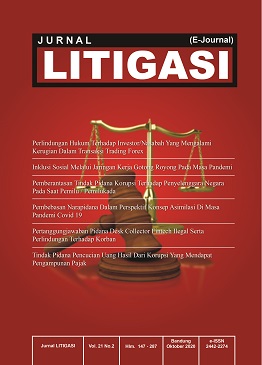TINDAK PIDANA PENCUCIAN UANG HASIL DARI KORUPSI YANG MENDAPAT PENGAMPUNAN PAJAK
Abstract
Taxpayers who participate in the tax amnesty program, provided that they should declare complete data and information on their assets, and clearly settled for taxation purposes, will not be subjected to any administrative sanctions and tax penalties. The tax amnesty law can neither prevent the disclosure of the data and information on the origin of the properties nor the origin of the reported money. Declared is in the form of data and information on assets, which originates from legal and illegal activities. This paper discusses assets resulting from the crime of money laundering, which can still be investigated and confiscated by the state, based on the law on money laundering and the law on corruption, even though asset data has been included in the tax amnesty. In principle, criminal sanctions cannot be abolished, just because they have paid taxes, or just because they have received tax amnesty.The results of the research in this paper are that the concept of tax amnesty law, money laundering and corruption requires the application of digitalization technology with the aim of expanding a taxation database that is valid, comprehensive, and integrated with an online system in order to force taxpayers to comply with taxes. , which will improve voluntary tax compliance for all taxpayers and for taxpayers who perpetrate money laundering in particular.So it is necessary to make a law that regulates tax penalties from replacement money which is calculated based on the present value of the perpetrator of the crime of laundering who has permanent (inkracht).
Keywords: money laundering, corruption, tax, assessable, tax amnesty.
Full Article
References
Alex, Cobham. 2020. “Aliran Dana Gelap Merusak Ekonomi.” Ddtcnews.Co.Id. 2020.
Friedman, Lawrence. 2001. American Law an Introduction Second Edition (Hukum Amerika Sebuah Pengantar. Jakarta: Tatanusa.
Hadjon, Philipus M., and Tatiek Sri Diatmati. 2005. Argumentasi Hukum. Yogyakarta: Gadjah Mada University Press.
Hartati, Neneng, and Boedi Abdullah. 2015. Pengantar Perpajakan. Bandung: Pustaka Setia.
Hendrik Mezak, Meray. 2006. “Jenis, Metode Dan Pendekatan Dalam Penelitian Hukum.” Law Review V (3): 85–97.
Hiariej, Eddy. 2013. “Pengembalian Asset Kejahatan.” Jurnal Opinio 13.
Kriekhoff, Valerine J.L. 2015. Metode Penelitian Hukum (Bagian I). Jakarta: Program Pascasarjana Fakultas Hukum Universitas Indonesia.
Pathorang, Halim. 2013. Penegakkan Hukum Terhadap Pencucian Uang Di Era Globalisasi. Jakarta: Total Media.
Remy, Sjahdeini Sutan. 2007. Seluk Beluk Pencucian Uang Dan Pembiayaan Terorisme. Jakarta: Pustaka Utama Grafiti.
Suharno. 2016. Panduan Praktis Amnesti Pajak Indonesia. Jakarta: Kompas Media Nusantara.
Sutedi, Adrian. 2015. Hukum Perizinan Dalam Sektor Pelayanan Publik. Jakarta: Sinar Grafika.
Syamsuddin, Aziz. 2011. Tindak Pidana Khusus. Jakarta: Sinar Grafika.
Tri Andrisman. 2008. Analisis Penegakan Hukum Tindak Pidana Korupsi Oleh Komisi Pemberantasan Korupsi (KPK). Vol. 2.
Wirawan, Ilyas, and Richard Burton. 2014. Hukum Pakar: Teori, Analisis Dan Perkembangannya. Jakarta: Salemba Empat.
Yunus, Husein. 2007. Bunga Rampai Anti Pencucian Uang : Kegiatan Pencucian Uang. Jakarta: Book Terace & Library.
Authors
Copyright (c) 2023 JURNAL LITIGASI (e-Journal)
This work is licensed under a Creative Commons Attribution-ShareAlike 4.0 International License.


